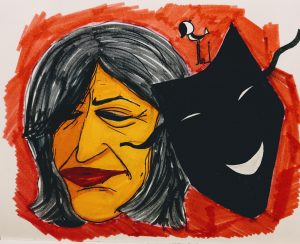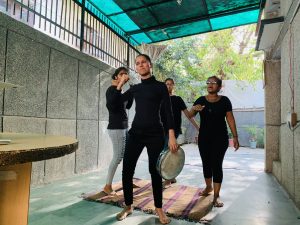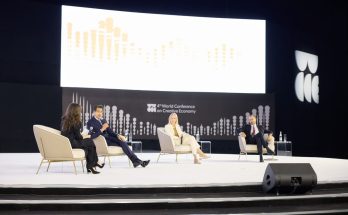
By Anuradha Marwah
There were two online events in the time of Covid-19 that set me thinking about the relationship between gender and a health calamity: a ticketed story-telling event on November 27, 2020 and two free-entry shows of a play called ‘Ubermensch’ (the Nietzschean term for Superman who rises above conventional Christian morality to create and impose his own values) on March 14 and 20, 2021. Both were done by women supported by the NGO, Shaktishalini, in collaboration with Pandies’ Theatre, Delhi.
In the first event they shared heart-rending, real-life stories of being beaten, abused, and exploited by husbands, fathers, brothers and boyfriends. The second event — a play comprising eight situations — was a collective and creative attempt to explore factors that lead to gender-based violence. The play ranged from representation of stock-situations like prioritisation of the male child in families and unequal distribution of domestic work to display of toxic masculinity by Bollywood icons that go into the creation of the ideology of “manliness”.
Covid, the Gender-leveller?

These were ‘non-Covid’ events as the health calamity was not mentioned even once. But they commanded attention: the first story-telling event because of its deeply disturbing nature and the second for the joie de vivre of the collectivity performing the play. The actors were passionate and they were having fun spoofing manly men. The roughly hundred people per show who sat in lonely rooms, isolated and enervated by Covid, could connect in real time with these powerful expressions of freedom and absorb their energy virtually. When I asked the facilitators and actors why there was no reference to Covid, the single biggest calamity facing the world, the answers were playful. An actor even tweaked Faiz’s famous line: “Aur bhi dukh hain zamane mein mohabbat ke siwa” to “Aur bhi dukh hain zamane mein Covid ke siwa” (There are other afflictions in the world besides Covid).
However, it seemed significant to me that these women should have explored the theme of male domination so deeply and cocked a snook at it at a time when WhatsApp groups have been alive with images and stories of men doing the dishes. A couple of articles in mainstream newspapers have gone to the extent of predicting that due to restrictions on domestic help, Covid is proving to be a gender-leveller by compelling men to participate in daily chores. Of course, there have been dissenting voices all along. In fact, the NGO Shaktishalini that runs a shelter home for women, was one of the first organisations to raise an alarm about the exponential increase in cases of domestic violence during the pandemic in India. In April 2020, their director pointed out in a news report that with the men constantly at home during the lockdown it had become difficult for victims to even make a call for help. This phenomenon is not limited to bastis as a lot of middle-class would like to believe. Work-from-home has meant a shrinking of both physical and mental spaces for women across classes. Nandita Das’s sensitive film Listen to Her (2020) makes this point via a woman protagonist who is trying to juggle office-work and her husband’s inconsiderate demands and, fortuitously, receives a call for help from another woman who is facing domestic abuse.
Feudal Hangover
I would say that the performances of the Shaktishalini women were a rejoinder to the lies we like to tell ourselves — especially those of us who are privileged. Inhabiting a seemingly different world from their economically disadvantaged sisters, and as a result of their low-paid labour as domestic workers, middle-class women in India have comfortably overlooked the fact that family life in India is still characterised by feudal modes and values. So, they hastily equate male dish-washing with liberation; an occasional muscular meal-making with gender parity. In contrast, the Shaktishalini women, having experienced gender-based violence and acted against it, are not so gullible. They instinctively expressed through stories what feminist scholars have been arguing with the help of examples and data.
History has shown that health calamities affect women more adversely than the men. For instance, available data establishes that due to the Ebola crisis in three African countries in 2014; Zika in 2015–6; and recent outbreaks of SARS, swine flu, and bird flu, women bore the brunt of job losses for much longer than the men. To add to this, cases of domestic and sexual violence increased manifold in these places. Taking off from the above findings, Helen Lewis in an article entitled “Coronavirus is a Disaster for Feminism” (The Atlantic; March 19 2020), played Cassandra, predicting that the virus would have the effect of sending “many couples back to the 1950s” in arguably gender-egalitarian England. Exasperated by the arrogance of the West and its failure to learn from world history, she was reacting to women slipping into traditional care-taking roles as the pandemic began to chip away at support systems. This is happening in India too where many working women, finding themselves in a double bind due to the work-from-home mode, are opting to give up their jobs.
Widening Gap
According to the Global Gender Gap report 2021, Covid has served to widen the gender gap worldwide and India has regressed further from its already low 2020 ranking. “Among the drivers of this decline (in India’s ranking) is a decrease in women’s labour force participation rate, which fell from 24.8% to 22.3%. In addition, the share of women in professional and technical roles declined further to 29.2%. The share of women in senior and managerial positions also remains low: only 14.6% of these positions are held by women and there are only 8.9% firms with female top managers,” the report said (1 April 2021, Hindustan Times). Lewis’s prediction is indeed turning out to be the Cassandra-truth. It flags the important issue about the global interconnectedness of women, or what was understood as feminist sisterhood in the 1960s, and, alerts us to the need for shaking off the complacency into which we have been lulled by post-feminist pronouncements.
But how do we begin to fix what appears to be an all-pervasive malady? How do we get rid of the stubborn persistence of male centred-ness on the world stage? Much like the virus, it is returning stronger with every season. To me, the Shaktishalini performances seemed to provide an answer. If the world is retreating into pre-feminist formulations, we, too, might need to deploy tried and tested modes of protest. The unambiguous challenge to patriarchy that these performances represented was exhilarating for me as it was for the three hundred viewers, both women and men, who participated in the long and commendatory discussions after every show.
The messages were simple and direct and inspired by the 1960s second-wave feminism: the personal is political; gender equality begins at home; silence and powerlessness go hand in hand. But the most inspirational takeaway were the impassioned acts that affirmed feminist activism or the faith that you can’t keep a good woman down. These young woman who were at one time on the receiving end of violence performed gender in a way to make it absolutely clear that things need to become more equal and democratic not less in the pandemic.
– Anuradha Marwah is a novelist and playwright. For her first directorial venture, Medea ( Hindustani, 55 min), she collaborated with a Minneapolis-based theatre company during her Fulbright-Nehru Academic and Professional Excellence (FNAPE) fellowship in 2017. More information on her work is available on http://anuradhamarwah.com
– Setting the Stage’ by author and academic, Anuradha Marwah, is an occasional column on theatre, performance and life. The author’s sketch us by Namrata Jain.
Author Profile
- India Writes Network (www.indiawrites.org) is an emerging think tank and a media-publishing company focused on international affairs & the India Story. Centre for Global India Insights is the research arm of India Writes Network. To subscribe to India and the World, write to editor@indiawrites.org. A venture of TGII Media Private Limited, a leading media, publishing and consultancy company, IWN has carved a niche for balanced and exhaustive reporting and analysis of international affairs. Eminent personalities, politicians, diplomats, authors, strategy gurus and news-makers have contributed to India Writes Network, as also “India and the World,” a magazine focused on global affairs.
Latest entries
 DiplomacyJanuary 5, 2026India walks diplomatic tightrope over US operation in Venezuela
DiplomacyJanuary 5, 2026India walks diplomatic tightrope over US operation in Venezuela India and the WorldNovember 26, 2025G20@20: Africa’s Moment – The Once and Future World Order
India and the WorldNovember 26, 2025G20@20: Africa’s Moment – The Once and Future World Order DiplomacyOctober 4, 2025UNGA Resolution 2758 Must Not Be Distorted, One-China Principle Brooks No Challenge
DiplomacyOctober 4, 2025UNGA Resolution 2758 Must Not Be Distorted, One-China Principle Brooks No Challenge India and the WorldJuly 26, 2025MPs, diplomats laud Operation Sindoor, call for national unity to combat Pakistan-sponsored terror
India and the WorldJuly 26, 2025MPs, diplomats laud Operation Sindoor, call for national unity to combat Pakistan-sponsored terror







